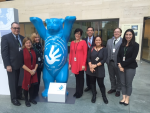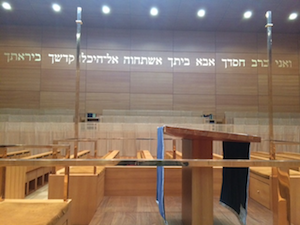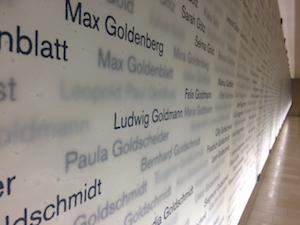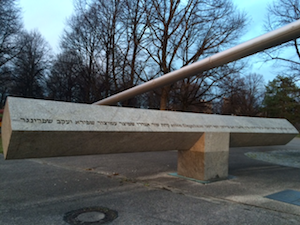Ira Hoffecker’s Berlin Identities is at Zack Gallery until July 3. (photo from Ira Hoffecker)
Rarely does the Sidney and Gertrude Zack Gallery at the Jewish Community Centre of Greater Vancouver present exclusively a non-Jewish artist. This month, however, the gallery features Ira Hoffecker’s solo exhibit Berlin Identities.
Born and raised in Germany, the horrible history of Nazism and the Holocaust are part of Hoffecker’s identity, the identity she explores in this exhibition and in the entirety of her art. She looks at the Holocaust from the perspective of a German born after the Second World War.
“Germany is rich in history. There are so many layers,” she said in an interview with the Independent. “But the history of WWII and Nazism is different. The previous generations – my parents and grandparents – didn’t want to talk about it. My mother was a child during the war, and all she and her parents wanted after the war was to forget. But we can’t forget. We can’t deny our responsibility. For years after the war, there was a leaden blanket over the Holocaust, over what Germany did. But you can only move on if you accept the past, even such a horrible past as the Holocaust. It’s easy to say: it wasn’t me, I wasn’t born yet, but it’s our heritage. We have to accept our guilt, to acknowledge it, before we can start to heal as a society.”
That’s what her art is about: trying to understand and accept the painful enormity of the Holocaust and the guilt Germany carries, trying to discover her own definition of self underneath those national memories.
Another theme in her art, intertwined with the first, has to do with urban identities. “My paintings are informed by the different identities cities assume over time,” she explained. “History transforms cities, changes the urban space.”
All of the paintings in Hoffecker’s current show reflect her search for personal and urban identities. They are interpretations of maps: colorful, stylized and multilayered.
The layers represent the passing of time, as demonstrated by several paintings of Scheunenviertel, the former Jewish quarter in Berlin. “Before the Nazis came to power, over 150,000 Jews lived there. By the end of the war, none remained,” said Hoffecker.
Accordingly, the main layer denotes what the district looked like right after the war, while the overlaying layer, mounted on Plexiglas, corresponds with the map as it is currently. “The layers are a metaphor – of forgetting, of suppressing the past,” she explained. “Of the inevitable change.”
Two of the paintings look even scarier. One is covered by steel mesh, like a concentration camp fence. Another is concealed under torn tissue paper, where only fragments of the original map are visible, the rest is hidden – perhaps by those who don’t wish to remember. However, “we must remember,” the artist insists, and she tries to stir the memories by her imagery.
As is true for geographical maps, color and geometry play huge roles in Hoffecker’s creations.
“I’m fascinated by colors and I love maps,” she said. “As a child, my favorite book was an atlas. I like studying maps. I have a huge collection at home. My husband calls me a human GPS. I never have trouble navigating in any city, but only cities. I’m an urban person; I don’t do well in the wild.”
With her love for maps, it’s not surprising that she likes traveling. “Every city I ever visited has its own identity, its own atmosphere. I have been in many: all over Europe, India, Egypt, Peru. I’ve moved 26 times, but I hope I’ve stopped at last. I live in Victoria now and I don’t intend to move again.”
Her road from Germany to Vancouver Island was somewhat out of the ordinary.
“I always liked art, but when I lived in Germany, I worked in marketing and publicity for the movie industry,” she said. “Then, my husband and I had our own movie marketing company in Hamburg. Fifteen years ago, we came to Vancouver Island for a vacation. My children were young. We rented a mobile home and traveled together. We loved British Columbia, but the movie producers kept calling us, even though we were on vacation. They could call in the middle of the night, and I thought, What am I doing in this rat race? We needed a change.”
In 2004, they acted on the need for change and moved to Canada, settling in Victoria. “My children went to school there, and I went to school, too,” she said. “I decided to follow my old dream and change careers. I wanted to become an artist. Since we moved to Canada, I’ve been a student of the arts, but the career change is not easy or fast. It’s like a circus salto mortale, almost a free fall. It’s scary.”
But she hasn’t let the fear stop her. She has become an internationally known artist. In the last few years, she has participated in a number of solo and group exhibitions in Canada, England and Germany. She is studying for her master’s degree, and her paintings have started gaining recognition in artistic circles and among private collectors.
“I’ve sold over 170 paintings,” she said. “Recently, I was nominated, together with 53 other artists, for the British John Moore Painting Prize 2016. Our paintings will be shown within the Liverpool Biennal. They were selected from over 4,000 submissions.”
Another big change is coming soon for Hoffecker.
“We are not Canadian citizens yet,” she said. “Until a couple years ago, Germany didn’t accept dual citizenship, and I couldn’t give up my German citizenship either; I’m German. Now that it is possible to have dual citizenship, my family will receive our Canadian citizenship. It will happen on July 1st, on Canada Day.”
Berlin Identities will be on display at the Zack until July 3.
Olga Livshin is a Vancouver freelance writer. She can be reached at [email protected].






